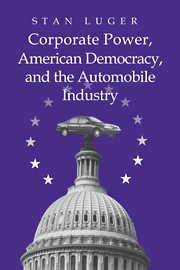Book contents
- Frontmatter
- Contents
- Acknowledgments
- Introduction
- 1 Studying Power in America
- 2 The Structure of the Auto Industry
- 3 Corporate Political Hegemony and Its Decline: 1916–1966
- 4 The Politics of Compromise: 1967–1978
- 5 The Resurgence of Corporate Power: 1979–1981
- 6 The Triumph of Corporate Power: Regulatory Policy, 1981–1988
- 7 The Triumph of Corporate Power: Trade Policy, 1981–1985
- 8 Interregnum: 1989–1996
- Conclusion: Corporate Power and American Democracy
- Index
4 - The Politics of Compromise: 1967–1978
Published online by Cambridge University Press: 08 October 2009
- Frontmatter
- Contents
- Acknowledgments
- Introduction
- 1 Studying Power in America
- 2 The Structure of the Auto Industry
- 3 Corporate Political Hegemony and Its Decline: 1916–1966
- 4 The Politics of Compromise: 1967–1978
- 5 The Resurgence of Corporate Power: 1979–1981
- 6 The Triumph of Corporate Power: Regulatory Policy, 1981–1988
- 7 The Triumph of Corporate Power: Trade Policy, 1981–1985
- 8 Interregnum: 1989–1996
- Conclusion: Corporate Power and American Democracy
- Index
Summary
If auto industry executives thought the worst was over with the 1966 passage of the National Traffic and Motor Vehicle Safety Act, they were wrong. With the rise of the environmental movement, the social consequences of technology increasingly became a contested political issue and attention was focused on the car's impact on the environment. New organizations such as the Center for Auto Safety and Public Citizen, lobbying on behalf of the public interest, expanded the scope of conflict surrounding automotive politics. The results of this new politics was the regulation of pollution emissions in 1970 and fuel economy in 1975.
During this time, automotive politics was characterized by bargaining and compromise, with industry officials resisting each new encroachment on their autonomy, but as battles were lost, new federal mandates were put in place and complied with. Reformist in nature, none of these mandates threatened the centrality of the automobile to American society. Nonetheless, by the late 1970s the reforms of this period were largely over, and by 1979 the industry had recaptured much of its lost political influence. This turnaround resulted from a series of economic events – two oil shocks and a recession – coupled with a change in the industry's political tactics. In response to the turbulent economic events of the 1970s, each of which hurt sales, the automakers altered their lobbying efforts to emphasize the issue of jobs. Because of the industry's central economic position, the argument that government regulation would cost jobs, made at a time of high unemployment, provided leverage that environmental groups were in no position to match.
- Type
- Chapter
- Information
- Publisher: Cambridge University PressPrint publication year: 1999



